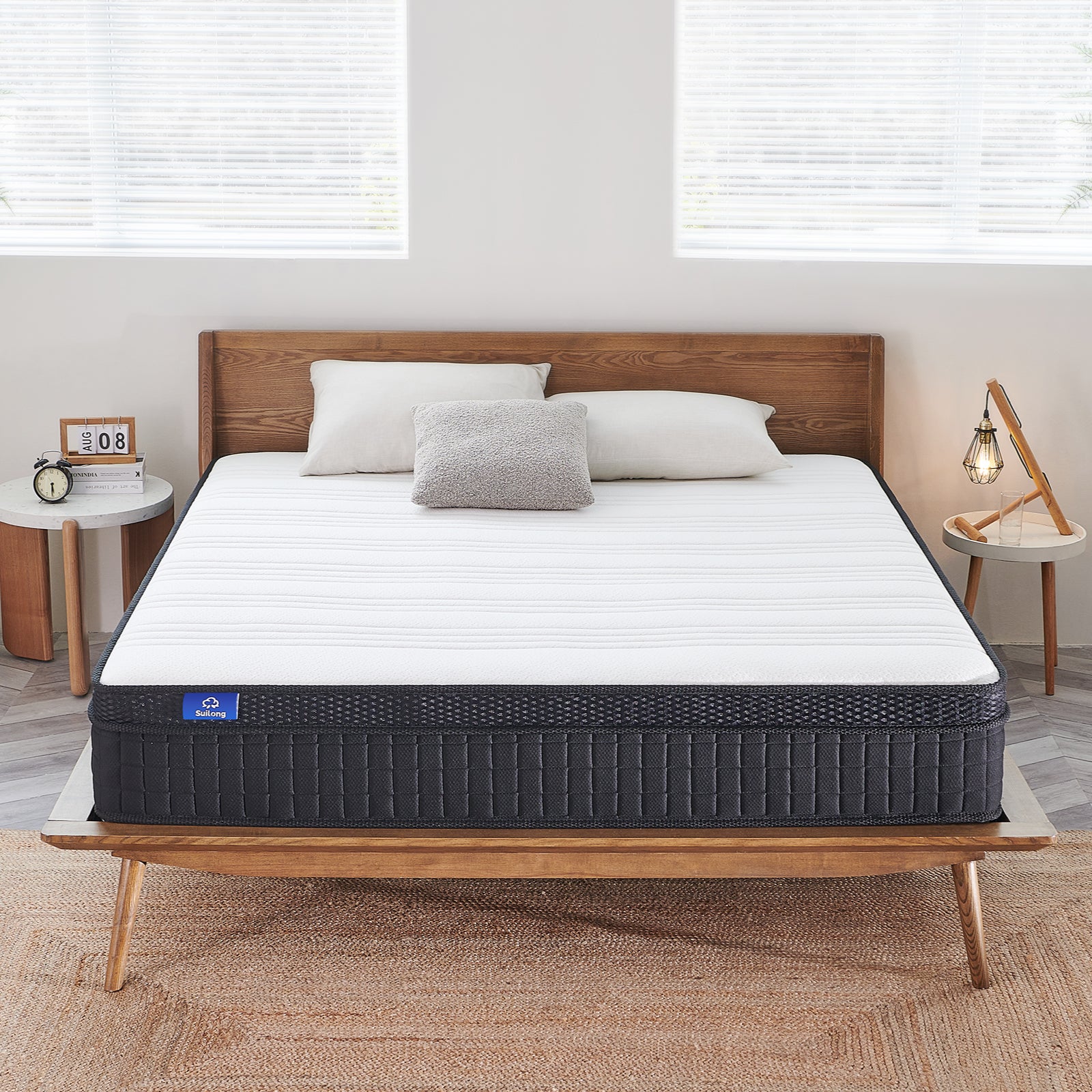Unlocking Deep Sleep Secrets for Ultimate Nightly Rest

Want to know how to get deeper sleep and give your body and brain a real rest? With the accelerated pace of modern life, many people find themselves tossing and turning in the night, struggling to get into that deep sleep.
In this article, we're going to delve deeper into the secrets of deep sleep and how you can optimise your sleep environment and habits to help you enjoy quality sleep every night. To sleep better, let's get started!
What is deep sleep?
Deep sleep is one of several sleep stages we experience overnight. It is during this stage that the body is most active in recovery and growth.
- Characteristics of deep sleep: In deep sleep, heart and breathing rates are reduced to minimal levels and muscles are completely relaxed. Blood pressure drops and blood flows to the muscles to provide more oxygen and nutrients.
- Differences from REM sleep: Deep sleep is part of non-REM sleep, and unlike REM sleep, brain activity slows down during deep sleep, while the brain is very active during REM sleep.

Stages of Sleep
Understanding the different stages of sleep can help us better understand deep sleep and the entire sleep cycle.
- Early stages of sleep: People enter a light sleep state where the body begins to relax, the heartbeat and breathing are slow, and the eyes move slowly.
- Deep Sleep: This is the most effective stage for the body to repair and grow, the immune system is strengthened and memories are consolidated.
- REM sleep: brain activity increases, dreams occur, eyes move rapidly while muscles in the rest of the body go into paralysis.
How much deep sleep is required?
The amount of deep sleep required varies from person to person.
- Average recommended duration: Adults usually need 7-9 hours of sleep per night, of which 20% to 25% should be deep sleep.
- Age factor: Deep sleep may decrease as we age because of decreased production of growth hormone.
- Individual differences: Everyone's needs are different and finding the right deep sleep pattern for you is key.

Benefits of deep sleep
Deep sleep has many benefits for both the body and the brain.
- The body is rested: deep sleep helps the body repair tissues and muscles, boost the immune system and release growth hormones.
- The brain gets recharged: during the deep sleep stage, the brain removes waste and helps with memory integration.
What happens if I don't get enough deep sleep?
Lack of deep sleep can lead to many health problems.
- Physical exhaustion: insufficient deep sleep may cause the body to feel weak and the immune system to decline.
- Distraction and memory loss: deep sleep helps with memory integration, and lack of deep sleep may affect memory and learning ability.

How to get more deep sleep?
There are a number of steps you can take to increase deep sleep.
- Adjust your routine: sticking to a consistent routine helps to adjust your biological clock.
- Appropriate bedding: Choosing the right Suilong mattress for you, such as Memory Foam Mattresses, provides adequate support.
https://suilong.org/products/suilong-galaxy-14-inch-luxury-hybrid-mattress
- Relaxation: Relax your body and brain through deep breathing, yoga and meditation, for example.
- Evening Habits: Avoid indulging in electronic gadgets and choose to read or listen to soft music to relax.
When should I consult my doctor about sleep problems?
Persistent sleep problems can be an early sign of health problems.
- Prolonged sleep disturbances: Persistent lack of deep sleep may be a sign of a more serious health problem.
- Sleep disorders affecting daily life: If sleep problems are interfering with work, school or daily activities, professional help should be sought immediately.
Sleep is the cornerstone of life, and deep sleep is a crucial time for the body and brain to truly recover. We've explored the importance of deep sleep, how to increase it, and when you should seek expert help. Hopefully, you can use this knowledge to adjust your habits so that you can have better quality sleep every night. Remember, every night of quality sleep is an investment in better performance tomorrow. I wish you sweet dreams!
Read More:
https://suilong.org/blogs/blogs/a-full-breakdown-of-bed-frame-options-for-hybrid-mattresses
https://suilong.org/blogs/blogs/full-vs-queen-mattress
FAQ
Q: How do you increase deep sleep?
A: To increase deep sleep, it's essential to maintain a consistent sleep schedule, create a calm bedroom environment, avoid electronics before bedtime, limit caffeine and alcohol intake, and engage in regular physical activity. Additionally, relaxation techniques such as meditation and deep-breathing exercises can also promote deeper sleep.
Q: What causes lack of deep sleep?
A: Several factors can lead to a lack of deep sleep including stress, an uncomfortable sleeping environment, certain medications, excessive caffeine or alcohol consumption, and underlying sleep disorders such as sleep apnea or restless legs syndrome.
Q: How many hours of deep sleep should you get?
A: On average, a healthy adult should aim for 1-2 hours of deep sleep per night, which constitutes 20-25% of a full night's sleep. However, the exact amount can vary based on age and individual needs.
Q: What is shallow sleep syndrome?
A: Shallow sleep syndrome isn't a medically recognized condition. People often use the term to describe a feeling of not getting restful or deep sleep. It might indicate interrupted sleep cycles or the presence of a sleep disorder.
Q: Is little deep sleep normal?
A: While deep sleep is crucial for physical and mental recovery, the amount can vary by individual. Factors like age, lifestyle, and overall health can influence deep sleep durations. If you consistently feel tired despite getting ample sleep, it's advisable to consult a sleep specialist.
Q: Is deep sleep required by age?
A: Deep sleep is essential at all ages for body repair and memory consolidation. However, as individuals age, the proportion of deep sleep tends to decrease. Older adults might experience shorter deep sleep phases or find it harder to enter this sleep stage.
Q: Is the Apple Watch sleep tracker accurate?
A: The Apple Watch sleep tracker provides a general overview of sleep patterns using motion detection and heart rate monitoring. While it offers useful insights, it might not be as precise as specialized medical equipment used in sleep labs.
Q: At what age does deep sleep decrease?
A: The amount of deep sleep tends to decrease as we age. By middle age, many people experience a noticeable reduction in deep sleep. This decline continues into the senior years, with some older adults having little to no deep sleep.
Q: Is 15 minutes of deep sleep enough?
A: Ideally, adults should aim for 1-2 hours of deep sleep nightly. While 15 minutes is on the low side, various factors can influence deep sleep durations. If you're concerned about your sleep patterns, it's wise to consult a sleep specialist.
Q: Does melatonin improve deep sleep?
A: Melatonin is a natural hormone that regulates the sleep-wake cycle. Supplementing with melatonin can help some individuals fall asleep faster and may increase the proportion of REM sleep, another vital sleep stage. However, its impact on deep sleep is still being researched. Before taking melatonin or any supplement, it's important to discuss with a healthcare provider.
-
Posted in
best sleeping position, Lifestyle, Sleep Experts, Sleep Tips, sleeping positions
















